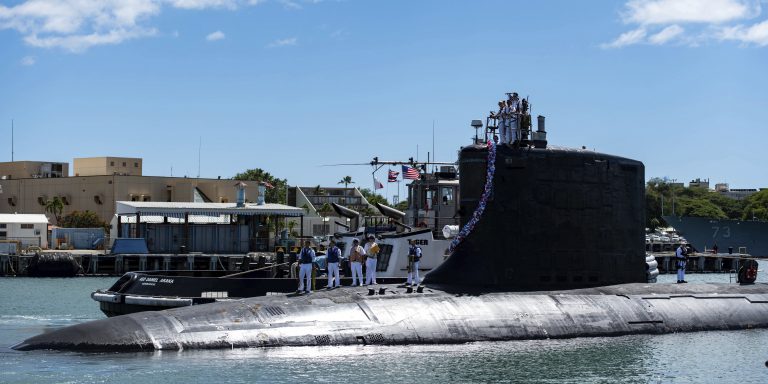INTELBRIEF
September 22, 2021
IntelBrief: The Transatlantic Fallout over AUKUS and What it Means for Containing China

Bottom Line Up Front
- The Australia-United Kingdom-United States (AUKUS) accord is part of the Biden administration’s strategic shift to focus more closely on the Indo-Pacific region, the cornerstone of a strategy to counter a rising China.
- French Foreign Minister Jean-Yves Le Drian told a French radio program that the AUKUS deal was a “unilateral, brutal, unpredictable decision” by the United States, labeling it as a “stab in the back.”
- The AUKUS deal and France’s exclusion from the partnership could spur Paris, and the EU more broadly, to increase defense spending and develop military capabilities that provide “strategic autonomy.”
- More than a decade after the so-called “pivot to Asia,” Washington seems serious about building a coalition to contain growing Chinese influence in the Indo-Pacific.
Last week, headlines were dominated by the newly announced trilateral security partnership between Australia, the United Kingdom, and the United States, referred to as AUKUS. The UK and U.S. agreed to help Australia develop and deploy nuclear powered submarines in the Pacific Ocean, which many analysts see as a direct challenge to China’s growing maritime influence in the region. France was part of the collateral damage, however, with the Australians pulling out of a $66 billion deal to buy French diesel-powered submarines. The AUKUS deal is part of the Biden administration’s strategic shift to focus more closely on the Indo-Pacific region, the cornerstone of a strategy to counter a rising China. The submarines, which can remain submerged for months on end, are more difficult to detect, and may be equipped with cruise missiles, are designed to help alter the balance of power in the Indo-Pacific region. Critically, the deal also boosts interoperability between Australia and the U.S. Pacific Fleet.
France reacted harshly, moving to recall its ambassadors to both Washington and Canberra in an unprecedented move. The deal was perceived as an embarrassing snub to Paris, and one which the French believe is another unilateral move on the part of the Biden administration taken without consultation with longstanding allies like France, including the withdrawal and subsequent botched evacuation from Afghanistan. French Foreign Minister Jean-Yves Le Drian told a French radio program that the AUKUS deal was a “unilateral, brutal, unpredictable decision” by the United States, labeling it as a “stab in the back. ”Some in Washington, however, believe that France’s outrage was less about diplomacy and strictly about the business implications of the arrangement, since the French defense industry suffered a massive loss in the collapse of its submarine deal. Nevertheless, the French felt slighted that they were not informed of the partnership before its announcement, adding insult to the injury of a scuttled multi-billion-dollar defense deal. Against the backdrop of aspirations that President Biden would be a more predictable and proactive international partner, France’s disappointment has been especially acute and echoed by the European Union.
French President Emmanuel Macron has long been a proponent of “strategic autonomy,” especially when it comes to balancing China’s growing power, both military and economic. For its part, the UK under Prime Minister Boris Johnson has sought to assume a more robust independent posture as part of its “Global Britain” strategy in a post-Brexit world. For Australia, a closer alliance with the UK and the U.S. makes more sense than a bilateral deal with France. Some European allies would prefer not to provoke China at all, seeing Beijing’s cooperation on issues like climate change and trade as critical. A recently published policy paper, titled the “E.U. Strategy for Cooperation in the Indo-Pacific,” calls for “multifaceted engagement” with Beijing, including collaborating on areas of mutual interest while also “pushing back” on issues where “fundamental disagreement exists.” The AUKUS deal and France’s exclusion from the partnership could spur Paris, and the European Union more broadly, to begin thinking about increasing defense spending and developing military capabilities that are less reliant on the United States.
The recent rift will heal with time, but the underlying message should not be overlooked. More than a decade after the Obama administration’s so-called “pivot to Asia,” Washington seems serious about moving away from its twenty-year focus on counterterrorism toward building a coalition to contain growing Chinese influence in the Indo-Pacific, even though events in Afghanistan, for example, have shown that the two approaches should not be considered as mutually exclusive. Another component to this strategy is the re-emergence of the Quadrilateral Security Dialogue (The Quad), a strategic dialogue between the United States, Australia, India, and Japan. But the U.S. and its allies must also balance the desire to prepare for great power competition with other crucial objectives, including responding to climate change and battling the ongoing COVID-19 pandemic. While China bristles against what it perceives are efforts by other nations to contain its rapid growth and complains of “cold war mentalities,” Western countries have determined that a robust and strategic response to Beijing’s aggression will be critical to long term security in the region.